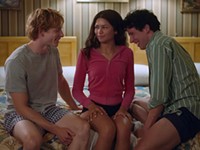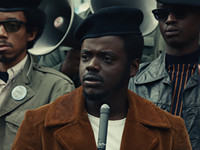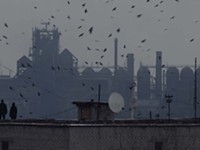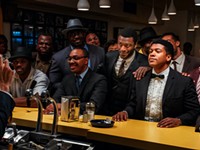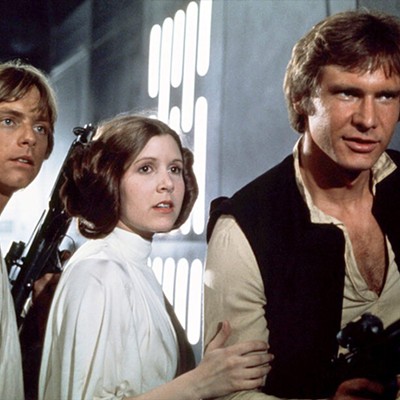[
{
"name": "500x250 Ad",
"insertPoint": "5",
"component": "15667920",
"parentWrapperClass": "",
"requiredCountToDisplay": "1"
}
]
Most directors faced with a brief hiatus between principal photography and post-production for a gargantuan comic-book blockbuster like "The Avengers" would probably be content to kick up their heels for a bit, take a well-deserved vacation, and maybe, if they're feeling exceptionally ambitious, start poking around for the next project they'll start working on sometime in the semi-distant future. But most directors are not Joss Whedon. Thank god.
Instead of resting on his laurels, Whedon spent his downtime in the Marvel movie-verse rounding up his stable of actor friends and enlisting them to star in a micro-budgeted adaptation of William Shakespeare's "Much Ado About Nothing," filmed over the course of 12 days in his own Santa Monica home. Of course, "The Avengers" turned out to be a huge worldwide success, both commercially and critically, eventually going on to become one of the highest-grossing movies of all time. And according to Whedon, it was due in large part to the creative recharge he got from shooting this labor of love.
Aside from shifting the action of the 16th century play to the modern day, Whedon sticks closely to the original work (including dialect), which follows the intertwining plights of two pairs of would-be lovers: the adversarial Beatrice (Amy Acker, "The Cabin in the Woods") and Benedick (Alexis Denisof, "Angel"), engaged in a "merry war" against one another; and Claudio (Fran Kranz, also of "The Cabin in the Woods") and Hero (Jillian Morgese, an extra in "The Avengers"), a young couple head-over-heels in love in the way that only young couples in Shakespearean plays can be. This being Shakespeare, the plot revolves around various cases of deception, mistaken identity, and professions of love that bring the couples together and/or tear them apart. Of course, this being one of the Bard's comedies, there's never a question that everything will be tied up in a happy ending and, likely, a wedding or two.
Starring a group of performers that span across the entire Whedonverse (as fans have affectionately dubbed the writer-director's body of work), all clearly having a ball, the film has an infectious "Let's put on a show!" charm. It's a delight to watch, and the proceedings are only enhanced if you have a familiarity with and fondness for this particular group of actors. I admit that I found myself momentarily distracted several times, as a new character popped up on screen and I mentally tried to place from which Whedon project I recognized the performer.
Certain members of the cast clearly know their way around a Shakespearean turn of phrase better than others. Amy Acker delivers a superb performance as the sharp-tongued Beatrice. With any luck, it's a performance that will get her noticed by more A-list directors and earn her the juicy roles that she richly deserves. Alexis Denisof's capable work suffers in comparison; he excels at playing the love-struck fool, but is slightly less successful during his more dramatic moments. Fran Kranz acquits himself quite well as Claudio, demonstrating his remarkable range (and showing off the fact that he's secretly got a smokin' body to boot), in a role far removed from his stoner character in "Cabin." At the screening I attended there was a palpable sense of joy from the moment Nathan Fillion came on screen, portraying the comedic role of the bumbling constable, Dogberry. I'm happy to report that his considerable charms are in no way hampered by Elizabethan dialect. Reed Diamond is another cast standout as the meddlesome Don Pedro.
Sticking with the original dialect is an interesting choice for Whedon, a writer known for his dialogue. But he's clearly aware that attempting to improve on Shakespeare's words is typically a recipe for disaster. The direction is workmanlike and mostly a no-frills affair, but it's all the better to showcase the performances. Oddly, the editing felt choppy at times, and the repeated fade to white as a transition between scenes came across as a little cheesy. The cinematography doesn't quite pop in the way that the best black-and-white photography does, but as one of my viewing companions noted, the de-saturated style was likely an easy way to get around not having to worry about the color palette of Whedon's home as the production design of the film was being decided.
But these are superfluous. nitpicky problems. What matters is that Whedon has succeeded in making a smart, lively, funny, and sexy interpretation, and perhaps most importantly, he makes the play accessible in a way that's rare to find in adaptations of Shakespeare. If nothing else, Whedon's built-in fanbase has the potential to bring an entirely new audience to the playwright's work, and that in itself is something worth celebrating.




